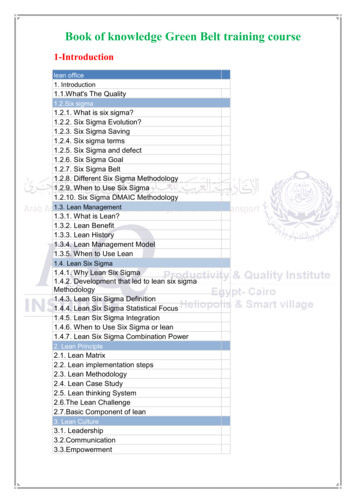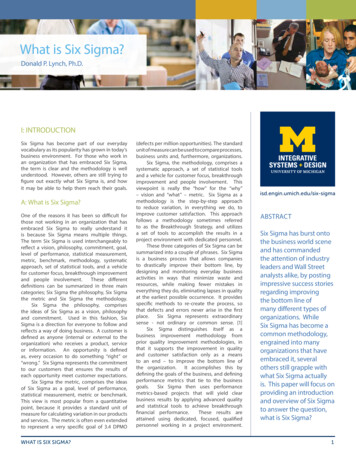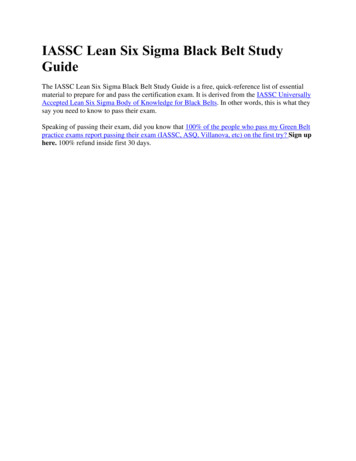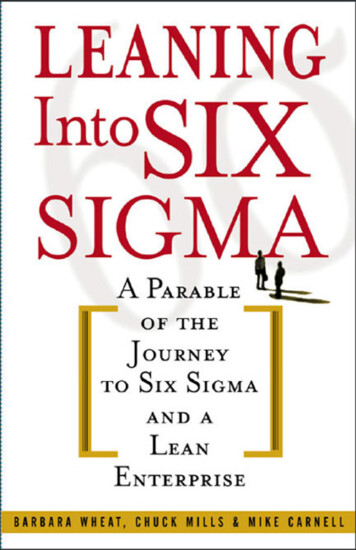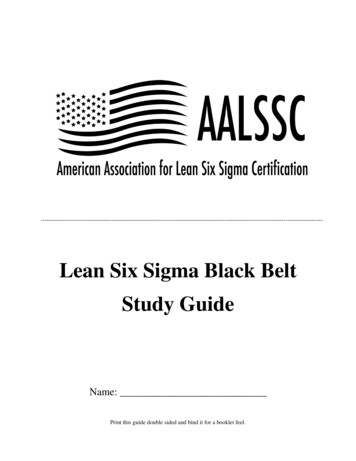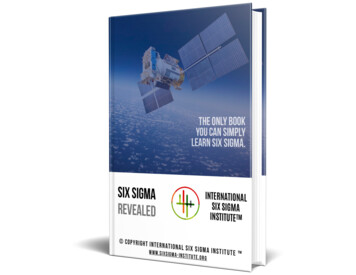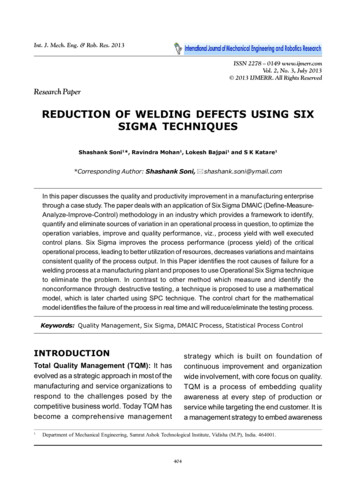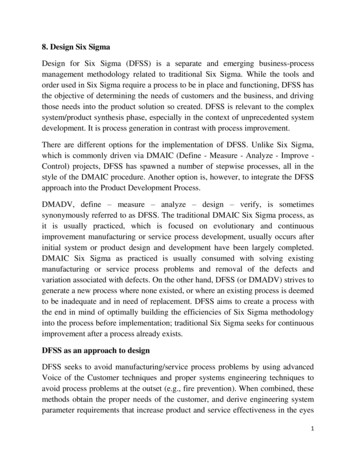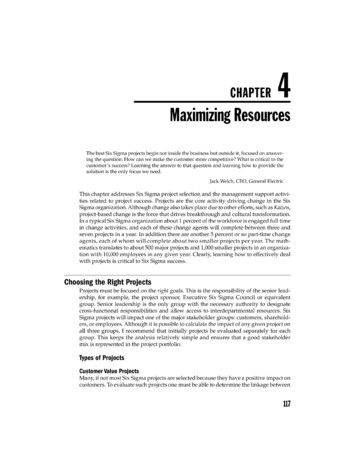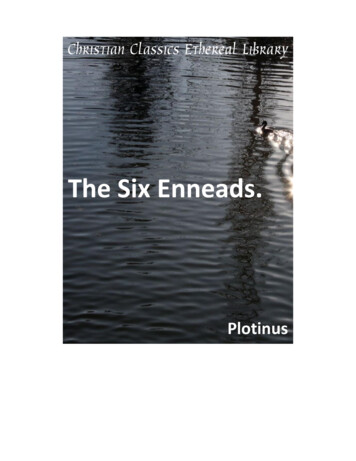
Transcription
The Six EnneadsAuthor(s):PlotinusMacKenna, Stephen (Translator)Page, B. S. (Translator)Publisher:Christian Classics Ethereal Library, Grand Rapids, MIDescription:Subjects:Plotinus is often accredited as the founder of Neo-Platonism.In an attempt to revive Platonic thought, this third centuryphilosopher and mystic wrote about issues such as virtue,happiness, reason, body, and soul, with Plato's philosophyas his guide. Like Plato, Plotinus had much disdain for material things and instead embraced the idea of a higher realmof immaterial intelligibility. Plotinus located the source ofcreation in a supreme "One." Plotinus believed this "One"transcended being, nonbeing, multiplicity, and division. TheEnneads were compiled by Plotinus' student, Porphyry, whogathered together his teacher's essays and arranged andedited them himself. These writings had a significant impacton the religious metaphysicians and mystics from the ancientworld. Plotinus has also influenced many thinkers of Islam,Indian Monism, and the Eastern Orthodox Church.Emmalon DavisCCEL Staff WriterGreek literatureTranslationsi
ContentsTitle Page1The First Ennead2First Tractate. The Animate and the Man.3Second Tractate. On Virtue.12Third Tractate. On Dialectice [The Upward Way].19Fourth Tractate. On True Happiness.23Fifth Tractate. Happines and Extension of Time.35Sixth Tractate. Beauty.39Seventh Tractate. On the Primal Good and Secondary Forms of Good [Other, on“On Happiness”].48Eighth Tractate. On the Nature and Source of Evil.50Ninth Tractate. “The Reasoned Dismissal”.62The Second Ennead63First Tractate. On the Kosmos or on the Heavenly System64Second Tractate. The Heavenly Circuit.72Third Tractate. Are the Stars Causes?.76Fourth Tractate. Matter in Its Two Kinds.89Fifth Tractate. On Potentiality and Actuality.102Sixth Tractate. Quality and Form-Idea.107Seventh Tractate. On Complete Transfusion.111Eighth Tractate. Why Distant Objects Appear Small.114Ninth Tractate. Against Those That Affirm the Creator of the Kosmos and theKosmos Itself to Be Evil: [Generally Quoted as “Against the Gnostics”].116The Third Ennead136First Tractate. Fate.137Second Tractate. On Providence (1).144Third Tractate. On Providence (2).161ii
Fourth Tractate. Our Tutelary Spirit.168Fifth Tractate. On Love.173Sixth Tractate. The Impassivity of the Unembodied.183Seventh Tractate. Time and Eternity.204Eighth Tractate. Nature Contemplation and The One.220Ninth Tractate. Detached Considerations.232The Fourth Ennead236First Tractate. On the Essence of the Soul (l).237Second Tractate. On the Essence of the Soul (2).238Third Tractate. Problems of the Soul (1).242Fourth Tractate. Problems of the Soul (2).270Fifth Tractate. Problems of the Soul (3).308Sixth Tractate. Perception and Memory.318Seventh Tractate. The Immortality of the Soul.322Eighth Tractate. The Soul’s Descent into Body.337Ninth Tractate. Are All Souls One?344The Fifth Ennead348First Tractate. The Three Initial Hypostases.349Second Tractate. The Origin and Order of the Beings. Following on the First.360Third Tractate. The Knowing Hypostates and the Transcendent.362Fourth Tractate. How the Secondaries Rise from the First: and on The One.380Fifth Tractate. That the Intellectual Beings Are Not Outside the IntellectualPrinciple: and on the Nature of The Good.383Sixth Tractate. That the Principle Transcending Being Has No Intellectual Act.What Being Has Intellection Primally and What Being Has It Secondarily.395Seventh Tractate. Is There an Ideal Achetype of Particular Beings?400Eighth Tractate. On the Intellectual Beauty.403Ninth Tractate. The Intellectual-Principle, the Ideas, and the Authentic Existence.414The Sixth Ennead423First Tractate. On the Kinds of Being (1).424Second Tractate. On the Kinds of Being (2).451Third Tractate. On the Kinds of Being (3).471iii
Fourth Tractate. On the Integral Omnipresence of the Authentic Existent (1).498Fifth Tractate. On the Integral Omnipresence of the Authentic Existent (2).512Sixth Tractate. On Numbers.521Seventh Tractate. On the Multiplicity of the Ideal-Forms Came into Being: andUpon the Good.538Eighth Tractate. On Free-Will and the Will of The One.572Ninth Tractate. On the Good, or The One.590iv
This PDF file is from the Christian Classics Ethereal Library, www.ccel.org. The mission ofthe CCEL is to make classic Christian books available to the world. This book is available in PDF, HTML, ePub, Kindle, and other formats. Seehttp://www.ccel.org/ccel/plotinus/enneads.html. Discuss this book online at http://www.ccel.org/node/3022.The CCEL makes CDs of classic Christian literature available around the world through theWeb and through CDs. We have distributed thousands of such CDs free in developingcountries. If you are in a developing country and would like to receive a free CD, pleasesend a request by email to cd-request@ccel.org.The Christian Classics Ethereal Library is a self supporting non-profit organization atCalvin College. If you wish to give of your time or money to support the CCEL, please visithttp://www.ccel.org/give.This PDF file is copyrighted by the Christian Classics Ethereal Library. It may be freelycopied for non-commercial purposes as long as it is not modified. All other rights are reserved. Written permission is required for commercial use.v
Title Page250 ADTHE SIX ENNEADSby Plotinustranslated by Stephen MacKenna and B. S. Page1
The First EnneadTHE FIRST ENNEAD2
First Tractate. The Animate and the Man.FIRST TRACTATE.THE ANIMATE AND THE MAN.1. Pleasure and distress, fear and courage, desire and aversion, where have these affectionsand experiences their seat?Clearly, either in the Soul alone, or in the Soul as employing the body, or in some thirdentity deriving from both. And for this third entity, again, there are two possible modes: itmight be either a blend or a distinct form due to the blending.And what applies to the affections applies also to whatsoever acts, physical or mental,spring from them.We have, therefore, to examine discursive-reason and the ordinary mental action uponobjects of sense, and enquire whether these have the one seat with the affections and experiences, or perhaps sometimes the one seat, sometimes another.And we must consider also our acts of Intellection, their mode and their seat.And this very examining principle, which investigates and decides in these matters,must be brought to light.Firstly, what is the seat of Sense-Perception? This is the obvious beginning since theaffections and experiences either are sensations of some kind or at least never occur apartfrom sensation.2. This first enquiry obliges us to consider at the outset the nature of the Soul — that iswhether a distinction is to be made between Soul and Essential Soul [between an individualSoul and the Soul-Kind in itself].1If such a distinction holds, then the Soul [in man] is some sort of a composite and atonce we may agree that it is a recipient and — if only reason allows — that all the affectionsand experiences really have their seat in the Soul, and with the affections every state andmood, good and bad alike.But if Soul [in man] and Essential Soul are one and the same, then the Soul will be anIdeal-Form unreceptive of all those activities which it imparts to another Kind but possessingwithin itself that native Act of its own which Reason manifests.If this be so, then, indeed, we may think of the Soul as an immortal — if the immortal,the imperishable, must be impassive, giving out something of itself but itself taking nothingfrom without except for what it receives from the Existents prior to itself from which Existents, in that they are the nobler, it cannot be sundered.Now what could bring fear to a nature thus unreceptive of all the outer? Fear demandsfeeling. Nor is there place for courage: courage implies the presence of danger. And such1All matter shown in brackets is added by the translator for clearness’ sake and, therefore, is not canonical.S.M.3
First Tractate. The Animate and the Man.desires as are satisfied by the filling or voiding of the body, must be proper to somethingvery different from the Soul, to that only which admits of replenishment and voidance.And how could the Soul lend itself to any admixture? An essential is not mixed. Or ofthe intrusion of anything alien? If it did, it would be seeking the destruction of its ownnature. Pain must be equally far from it. And Grief — how or for what could it grieve?Whatever possesses Existence is supremely free, dwelling, unchangeable, within its ownpeculiar nature. And can any increase bring joy, where nothing, not even anything good,can accrue? What such an Existent is, it is unchangeably.Thus assuredly Sense-Perception, Discursive-Reasoning; and all our ordinary mentationare foreign to the Soul: for sensation is a receiving — whether of an Ideal-Form or of animpassive body — and reasoning and all ordinary mental action deal with sensation.The question still remains to be examined in the matter of the intellections — whetherthese are to be assigned to the Soul — and as to Pure-Pleasure, whether this belongs to theSoul in its solitary state.3. We may treat of the Soul as in the body — whether it be set above it or actuallywithin it — since the association of the two constitutes the one thing called the living organism, the Animate.Now from this relation, from the Soul using the body as an instrument, it does not followthat the Soul must share the body’s experiences: a man does not himself feel all the experiences of the tools with which he is working.It may be objected that the Soul must however, have Sense-Perception since its use ofits instrument must acquaint it with the external conditions, and such knowledge comes byway of sense. Thus, it will be argued, the eyes are the instrument of seeing, and seeing maybring distress to the soul: hence the Soul may feel sorrow and pain and every other affectionthat belongs to the body; and from this again will spring desire, the Soul seeking the mendingof its instrument.But, we ask, how, possibly, can these affections pass from body to Soul? Body maycommunicate qualities or conditions to another body: but — body to Soul? Somethinghappens to A; does that make it happen to B? As long as we have agent and instrument,there are two distinct entities; if the Soul uses the body it is separate from it.But apart from the philosophical separation how does Soul stand to body?Clearly there is a combination. And for this several modes are possible. There might bea complete coalescence: Soul might be interwoven through the body: or it might be an IdealForm detached or an Ideal-Form in governing contact like a pilot: or there might be partof the Soul detached and another part in contact, the disjoined part being the agent or user,the conjoined part ranking with the instrument or thing used.In this last case it will be the double task of philosophy to direct this lower Soul towardsthe higher, the agent, and except in so far as the conjunction is absolutely necessary, to sever4
First Tractate. The Animate and the Man.the agent from the instrument, the body, so that it need not forever have its Act upon orthrough this inferior.4. Let us consider, then, the hypothesis of a coalescence.Now if there is a coalescence, the lower is ennobled, the nobler degraded; the body israised in the scale of being as made participant in life; the Soul, as associated with death andunreason, is brought lower. How can a lessening of the life-quality produce an increase suchas Sense-Perception?No: the body has acquired life, it is the body that will acquire, with life, sensation andthe affections coming by sensation. Desire, then, will belong to the body, as the objects ofdesire are to be enjoyed by the body. And fear, too, will belong to the body alone; for it isthe body’s doom to fail of its joys and to perish.Then again we should have to examine how such a coalescence could be conceived: wemight find it impossible: perhaps all this is like announcing the coalescence of things utterlyincongruous in kind, let us say of a line and whiteness.Next for the suggestion that the Soul is interwoven through the body: such a relationwould not give woof and warp community of sensation: the interwoven element might verywell suffer no change: the permeating soul might remain entirely untouched by what affectsthe body — as light goes always free of all it floods — and all the more so, since, precisely,we are asked to consider it as diffused throughout the entire frame.Under such an interweaving, then, the Soul would not be subjected to the body’s affections and experiences: it would be present rather as Ideal-Form in Matter.Let us then suppose Soul to be in body as Ideal-Form in Matter. Now if — the firstpossibility — the Soul is an essence, a self-existent, it can be present only as separable formand will therefore all the more decidedly be the Using-Principle [and therefore unaffected].Suppose, next, the Soul to be present like axe-form on iron: here, no doubt, the form isall important but it is still the axe, the complement of iron and form, that effects whateveris effected by the iron thus modified: on this analogy, therefore, we are even more strictlycompelled to assign all the experiences of the combination to the body: their natural seat isthe material member, the instrument, the potential recipient of life.Compare the passage where we read2 that “it is absurd to suppose that the Soul weaves”;equally absurd to think of it as desiring, grieving. All this is rather in the province of something which we may call the Animate.5. Now this Animate might be merely the body as having life: it might be the Couplementof Soul and body: it might be a third and different entity formed from both.2“;We read” translates “he says” of the text, and always indicates a reference to Plato, whose name does notappear in the translation except where it was written by Plotinus. S.M.5
First Tractate. The Animate and the Man.The Soul in turn — apart from the nature of the Animate — must be either impassive,merely causing Sense-Perception in its yoke-fellow, or sympathetic; and, if sympathetic, itmay have identical experiences with its fellow or merely correspondent experiences: desirefor example in the Animate may be something quite distinct from the accompanyingmovement or state in the desiring faculty.The body, the live-body as we know it, we will consider later.Let us take first the Couplement of body and Soul. How could suffering, for example,be seated in this Couplement?It may be suggested that some unwelcome state of the body produces a distress whichreaches to a Sensitive-Faculty which in turn merges into Soul. But this account still leavesthe origin of the sensation unexplained.Another suggestion might be that all is due to an opinion or judgement: some evil seemsto have befallen the man or his belongings and this conviction sets up a state of trouble inthe body and in the entire Animate. But this account leaves still a question as to the sourceand seat of the judgement: does it belong to the Soul or to the Couplement? Besides, thejudgement that evil is present does not involve the feeling of grief: the judgement mightvery well arise and the grief by no means follow: one may think oneself slighted and yet notbe angry; and the appetite is not necessarily excited by the thought of a pleasure. We are,thus, no nearer than before to any warrant for assigning these affections to the Couplement.Is it any explanation to say that desire is vested in a Faculty-of-desire and anger in theIrascible-Faculty and, collectively, that all tendency is seated in the Appetitive-Faculty? Sucha statement of the facts does not help towards making the affections common to theCouplement; they might still be seated either in the Soul alone or in the body alone. On theone hand if the appetite is to be stirred, as in the carnal passion, there must be a heating ofthe blood and the bile, a well-defined state of the body; on the other hand, the impulse towards The Good cannot be a joint affection, but, like certain others too, it would belongnecessarily to the Soul alone.Reason, then, does not permit us to assign all the affections to the Couplement.In the case of carnal desire, it will certainly be the Man that desires, and yet, on theother hand, there must be desire in the Desiring-Faculty as well. How can this be? Are weto suppose that, when the man originates the desire, the Desiring-Faculty moves to the order?How could the Man have come to desire at all unless through a prior activity in the DesiringFaculty? Then it is the Desiring-Faculty that takes the lead? Yet how, unless the body befirst in the appropriate condition?6. It may seem reasonable to lay down as a law that when any powers are contained bya recipient, every action or state expressive of them must be the action or state of that recipient, they themselves remaining unaffected as merely furnishing efficiency.6
First Tractate. The Animate and the Man.But if this were so, then, since the Animate is the recipient of the Causing-Principle[i.e., the Soul] which brings life to the Couplement, this Cause must itself remain unaffected,all the experiences and expressive activities of the life being vested in the recipient, the Animate.But this would mean that life itself belongs not to the Soul but to the Couplement; orat least the life of the Couplement would not be the life of the Soul; Sense-Perception wouldbelong not to the Sensitive-Faculty but to the container of the faculty.But if sensation is a movement traversing the body and culminating in Soul, how thesoul lack sensation? The very presence of the Sensitive-Faculty must assure sensation to theSoul.Once again, where is Sense-Perception seated?In the Couplement.Yet how can the Couplement have sensation independently of action in the SensitiveFaculty, the Soul left out of count and the Soul-Faculty?7. The truth lies in the Consideration that the Couplement subsists by virtue of theSoul’s presence.This, however, is not to say that the Soul gives itself as it is in itself to form either theCouplement or the body.No; from the organized body and something else, let us say a light, which the Soul givesforth from itself, it forms a distinct Principle, the Animate; and in this Principle are vestedSense-Perception and all the other experiences found to belong to the Animate.But the “We”? How have We Sense-Perception?By the fact that We are not separate from the Animate so constituted, even thoughcertainly other and nobler elements go to make up the entire many-sided nature of Man.The faculty of perception in the Soul cannot act by the immediate grasping of sensibleobjects, but only by the discerning of impressions printed upon the Animate by sensation:these impressions are already Intelligibles while the outer sensation is a mere phantom ofthe other [of that in the Soul] which is nearer to Authentic-Existence as being an impassivereading of Ideal-Forms.And by means of these Ideal-Forms, by which the Soul wields single lordship over theAnimate, we have Discursive-Reasoning, Sense-Knowledge and Intellection. From thismoment we have peculiarly the We: before this there was only the “Ours”; but at this stagestands the WE [the authentic Human-Principle] loftily presiding over the Animate.There is no reason why the entire compound entity should not be described as the Animate or Living-Being — mingled in a lower phase, but above that point the beginning ofthe veritable man, distinct from all that is kin to the lion, all that is of the order of the multiplebrute. And since The Man, so understood, is essentially the associate of the reasoning Soul,7
First Tractate. The Animate and the Man.in our reasoning it is this “We” that reasons, in that the use and act of reason is a characteristic Act of the Soul.8. And towards the Intellectual-Principle what is our relation? By this I mean, not thatfaculty in the soul which is one of the emanations from the Intellectual-Principle, but TheIntellectual-Principle itself [Divine-Mind].This also we possess as the summit of our being. And we have It either as common toall or as our own immediate possession: or again we may possess It in both degrees, that isin common, since It is indivisible — one, everywhere and always Its entire self — and severallyin that each personality possesses It entire in the First-Soul [i.e. in the Intellectual as distinguished from the lower phase of the Soul].Hence we possess the Ideal-Forms also after two modes: in the Soul, as it were unrolledand separate; in the Intellectual-Principle, concentrated, one.And how do we possess the Divinity?In that the Divinity is contained in the Intellectual-Principle and Authentic-Existence;and We come third in order after these two, for the We is constituted by a union of the supreme, the undivided Soul — we read — and that Soul which is divided among [living]bodies. For, note, we inevitably think of the Soul, though one undivided in the All, as beingpresent to bodies in division: in so far as any bodies are Animates, the Soul has given itselfto each of the separate material masses; or rather it appears to be present in the bodies bythe fact that it shines into them: it makes them living beings not by merging into body butby giving forth, without any change in itself, images or likenesses of itself like one face caughtby many mirrors.The first of these images is Sense-Perception seated in the Couplement; and from thisdownwards all the successive images are to be recognized as phases of the Soul in lesseningsuccession from one another, until the series ends in the faculties of generation and growthand of all production of offspring — offspring efficient in its turn, in contradistinction tothe engendering Soul which [has no direct action within matter but] produces by mere inclination towards what it fashions.9. That Soul, then, in us, will in its nature stand apart from all that can cause any of theevils which man does or suffers; for all such evil, as we have seen, belongs only to the Animate,the Couplement.But there is a difficulty in understanding how the Soul can go guiltless if our mentationand reasoning are vested in it: for all this lower kind of knowledge is delusion and is thecause of much of what is evil.When we have done evil it is because we have been worsted by our baser side — for aman is many — by desire or rage or some evil image: the misnamed reasoning that takesup with the false, in reality fancy, has not stayed for the judgement of the Reasoning-Principle:we have acted at the call of the less worthy, just as in matters of the sense-sphere we some8
First Tractate. The Animate and the Man.times see falsely because we credit only the lower perception, that of the Couplement, withoutapplying the tests of the Reasoning-Faculty.The Intellectual-Principle has held aloof from the act and so is guiltless; or, as we maystate it, all depends on whether we ourselves have or have not put ourselves in touch withthe Intellectual-Realm either in the Intellectual-Principle or within ourselves; for it is possibleat once to possess and not to use.Thus we have marked off what belongs to the Couplement from what stands by itself:the one group has the character of body and never exists apart from body, while all that hasno need of body for its manifestation belongs peculiarly to Soul: and the Understanding, aspassing judgement upon Sense-Impressions, is at the point of the vision of Ideal-Forms,seeing them as it were with an answering sensation (i.e., with consciousness) this last is atany rate true of the Understanding in the Veritable Soul. For Understanding, the true, isthe Act of the Intellections: in many of its manifestations it is the assimilation and reconciliation of the outer to the inner.Thus in spite of all, the Soul is at peace as to itself and within itself: all the changes andall the turmoil we experience are the issue of what is subjoined to the Soul, and are, as havesaid, the states and experiences of this elusive “Couplement.”10. It will be objected, that if the Soul constitutes the We [the personality] and We aresubject to these states then the Soul must be subject to them, and similarly that what We domust be done by the Soul.But it has been observed that the Couplement, too — especially before our emancipation— is a member of this total We, and in fact what the body experiences we say We experience.This then covers two distinct notions; sometimes it includes the brute-part, sometimes ittranscends the brute. The body is brute touched to life; the true man is the other, going pureof the body, natively endowed with the virtues which belong to the Intellectual-Activity,virtues whose seat is the Separate Soul, the Soul which even in its dwelling here may be keptapart. [This Soul constitutes the human being] for when it has wholly withdrawn, that otherSoul which is a radiation [or emanation] from it withdraws also, drawn after it.Those virtues, on the other hand, which spring not from contemplative wisdom butfrom custom or practical discipline belong to the Couplement: to the Couplement, too, belongthe vices; they are its repugnances, desires, sympathies.And Friendship?This emotion belongs sometimes to the lower part, sometimes to the interior man.11. In childhood the main activity is in the Couplement and there is but little irradiationfrom the higher principles of our being: but when these higher principles act but feebly orrarely upon us their action is directed towards the Supreme; they work upon us only whenthey stand at the mid-point.But does not the include that phase of our being which stands above the mid-point?9
First Tractate. The Animate and the Man.It does, but on condition that we lay hold of it: our entire nature is not ours at all timesbut only as we direct the mid-point upwards or downwards, or lead some particular phaseof our nature from potentiality or native character into act.And the animals, in what way or degree do they possess the Animate?If there be in them, as the opinion goes, human Souls that have sinned, then the Animating-Principle in its separable phase does not enter directly into the brute; it is there butnot there to them; they are aware only of the image of the Soul [only of the lower Soul] andof that only by being aware of the body organised and determined by that image.If there be no human Soul in them, the Animate is constituted for them by a radiationfrom the All-Soul.12. But if Soul is sinless, how come the expiations? Here surely is a contradiction; onthe one side the Soul is above all guilt; on the other, we hear of its sin, its purification, itsexpiation; it is doomed to the lower world, it passes from body to body.We may take either view at will: they are easily reconciled.When we tell of the sinless Soul, we make Soul and Essential-Soul one and the same: itis the simple unbroken Unity.By the Soul subject to sin we indicate a groupment, we include that other, that phase ofthe Soul which knows all the states and passions: the Soul in this sense is compound, allinclusive: it falls under the conditions of the entire living experience: this compound it isthat sins; it is this, and not the other, that pays penalty.It is in this sense that we read of the Soul: “We saw it as those others saw the sea-godGlaukos.” “And,” reading on, “if we mean to discern the nature of the Soul we must strip itfree of all that has gathered about it, must see into the philosophy of it, examine with whatExistences it has touch and by kinship to what Existences it is what it is.”Thus the Life is one thing, the Act is another and the Expiator yet another. The retreatand sundering, then, must be not from this body only, but from every alien accruement.Such accruement takes place at birth; or rather birth is the coming-into-being of that other[lower] phase of the Soul. For the meaning of birth has been indicated elsewhere; it is broughtabout by a descent of the Soul, something being given off by the Soul other than that actuallycoming down in the declension.Then the Soul has let this image fall? And this declension is it not certainly sin?If the declension is no more than the illuminating of an object beneath, it constitutesno sin: the shadow is to be attributed not to the luminary but to the object illuminated; ifthe object were not there, the light could cause no shadow.And the Soul is said to go down, to decline, only in that the object it illuminates livesby its life. And it lets the image fall only if there be nothing near to take it up; and it lets itfall, not as a thing cut off, but as a thing that ceases to be: the image has no further beingwhen the whole Soul is looking toward the Supreme.10
First Tractate. The Animate and the Man.The poet, too, in the story of Hercules, seems to give this image separate existence; heputs the shade of Hercules in the lower world and Hercules himself among the gods: treatingthe hero as existing in the two realms at once, he gives us a twofold Hercules.It is not difficult to explain this distinction. Hercules was a hero of practical virtue. Byhis noble serviceableness he was worthy to be a God. On the other hand, his merit was actionand not the Contemplation which would place him unreservedly in the higher realm.Therefore while he has place above, something of him remains below.13. And the principle that reasons out these matters? Is it We or the Soul?We, but by the Soul.But how “by the Soul”? Does this mean that the Soul reasons by possession [by contactwith the matters of enquiry]?No; by the fact of being Soul. Its Act subsists without movement; or any movement thatcan be ascribed to it must be utterly distinct from all corporal movement and be simply theSoul’s own life.And Intellection in us is twofold: since the Soul is intellective, and Intellection is thehighest phase of life, we have Intellection both by the characteristi
and experiences really have their seat in the Soul, and with the affections every state and mood, good and bad alike. But if Soul [in man] and Essential Soul are one and the same, then the Soul will be an Ideal-Form
